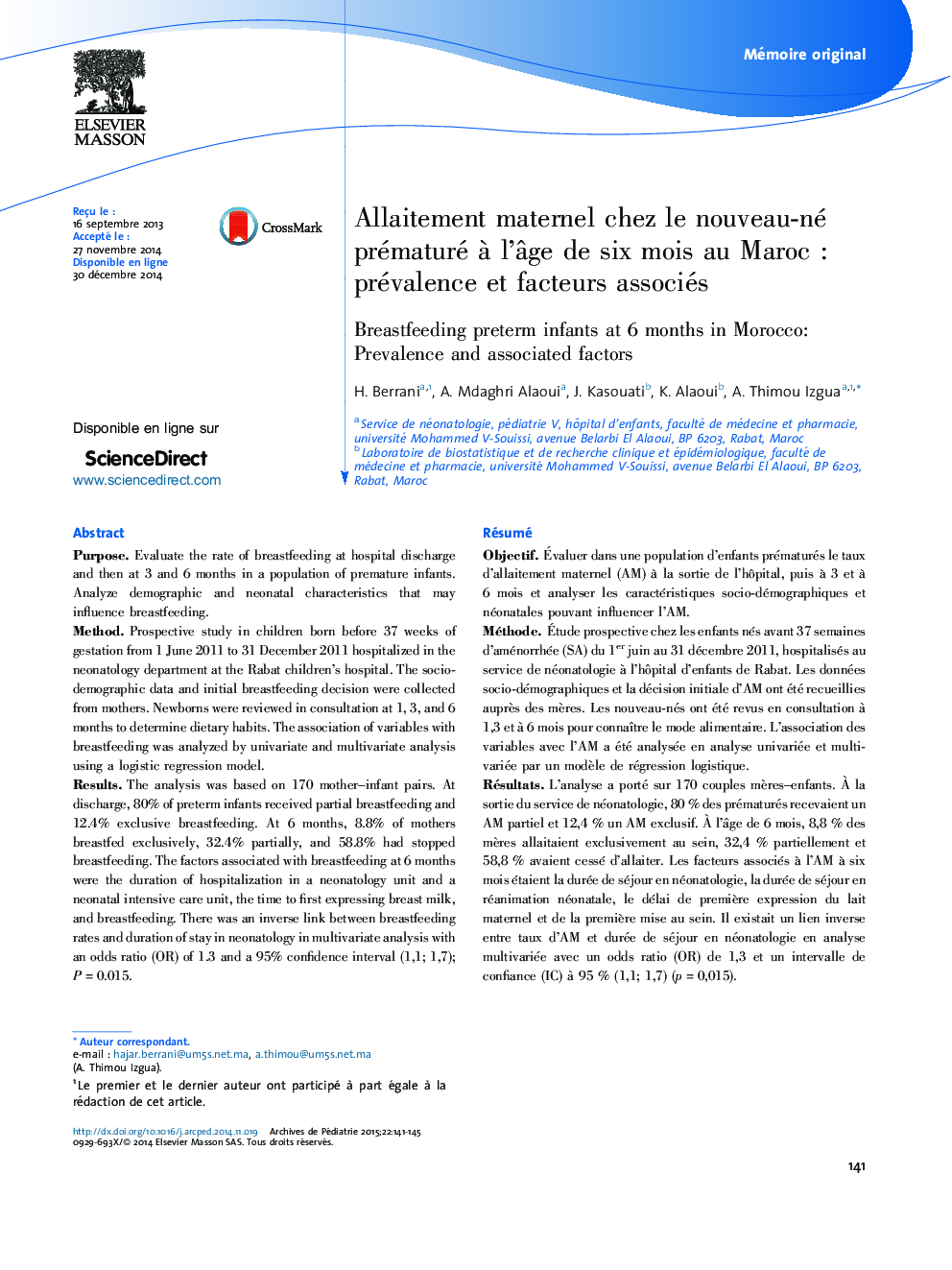| کد مقاله | کد نشریه | سال انتشار | مقاله انگلیسی | نسخه تمام متن |
|---|---|---|---|---|
| 4145985 | 1272627 | 2015 | 5 صفحه PDF | دانلود رایگان |

RésuméObjectifÉvaluer dans une population d’enfants prématurés le taux d’allaitement maternel (AM) à la sortie de l’hôpital, puis à 3 et à 6 mois et analyser les caractéristiques socio-démographiques et néonatales pouvant influencer l’AM.MéthodeÉtude prospective chez les enfants nés avant 37 semaines d’aménorrhée (SA) du 1er juin au 31 décembre 2011, hospitalisés au service de néonatologie à l’hôpital d’enfants de Rabat. Les données socio-démographiques et la décision initiale d’AM ont été recueillies auprès des mères. Les nouveau-nés ont été revus en consultation à 1,3 et à 6 mois pour connaître le mode alimentaire. L’association des variables avec l’AM a été analysée en analyse univariée et multivariée par un modèle de régression logistique.RésultatsL’analyse a porté sur 170 couples mères–enfants. À la sortie du service de néonatologie, 80 % des prématurés recevaient un AM partiel et 12,4 % un AM exclusif. À l’âge de 6 mois, 8,8 % des mères allaitaient exclusivement au sein, 32,4 % partiellement et 58,8 % avaient cessé d’allaiter. Les facteurs associés à l’AM à six mois étaient la durée de séjour en néonatologie, la durée de séjour en réanimation néonatale, le délai de première expression du lait maternel et de la première mise au sein. Il existait un lien inverse entre taux d’AM et durée de séjour en néonatologie en analyse multivariée avec un odds ratio (OR) de 1,3 et un intervalle de confiance (IC) à 95 % (1,1; 1,7) (p = 0,015).ConclusionLes taux d’AM chez le prématuré dans notre contexte restent inférieurs aux objectifs recommandés. L’impact négatif de la durée de séjour en néonatologie sur la durée d’AM est un défi pour les professionnels qui doivent adapter et renforcer la stratégie d’encouragement et de soutien à l’AM durant le séjour en néonatologie et après la sortie pour assurer une nutrition adéquate aux prématurés.
PurposeEvaluate the rate of breastfeeding at hospital discharge and then at 3 and 6 months in a population of premature infants. Analyze demographic and neonatal characteristics that may influence breastfeeding.MethodProspective study in children born before 37 weeks of gestation from 1 June 2011 to 31 December 2011 hospitalized in the neonatology department at the Rabat children's hospital. The sociodemographic data and initial breastfeeding decision were collected from mothers. Newborns were reviewed in consultation at 1, 3, and 6 months to determine dietary habits. The association of variables with breastfeeding was analyzed by univariate and multivariate analysis using a logistic regression model.ResultsThe analysis was based on 170 mother–infant pairs. At discharge, 80% of preterm infants received partial breastfeeding and 12.4% exclusive breastfeeding. At 6 months, 8.8% of mothers breastfed exclusively, 32.4% partially, and 58.8% had stopped breastfeeding. The factors associated with breastfeeding at 6 months were the duration of hospitalization in a neonatology unit and a neonatal intensive care unit, the time to first expressing breast milk, and breastfeeding. There was an inverse link between breastfeeding rates and duration of stay in neonatology in multivariate analysis with an odds ratio (OR) of 1.3 and a 95% confidence interval (1,1; 1,7); P = 0.015.ConclusionIn our context, the rates of breastfeeding in premature infants remain below the recommended goals. The negative impact of the length of stay in the neonatal unit on breastfeeding is a challenge for health professionals who must adapt and strengthen the strategy of encouragement and support breastfeeding during the stay in neonatology and after discharge to ensure adequate nutrition for premature infants.
Journal: Archives de Pédiatrie - Volume 22, Issue 2, February 2015, Pages 141–145